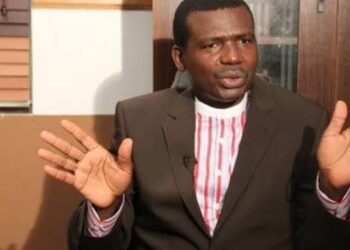By Emmanuel Onwubiko

The constant xenophobic violence unleashed on Nigerians living in South Africa has a constant reminder for the millions of Nigerians who subscribed to the paid television services of the wholly South African operated Multichoice television otherwise known as DSTV.
This reminder that the series of xenophic attacks on Nigerians in South African signals to Nigerians at home is the need to once and for all take our destiny in our hands and check how we continue to funnel our hard earned resources to a company from a very hostile environment such as South Africa.
These constant deadly attacks on Nigerians in south Africa although very negative, but it has one positive take away which is the definitive need for Nigerians and the Nigerian government to do the needful to support only businesses and services provided by companies owned fully or substantially by Nigerians just as the paid television sub-sector of the economy of Nigeria is one such area that millions of Nigerians must exercise their people’s power and transfer their patronage to such companies like Startimes/NTA; from MTN to Glo; from DSTV to Startimes; from Shoprite to Sahara/Next cash and carry and from Stanbic IBTC to a bank like Zenith; UBA; Fidelity; Union Bank; Access and a few other Nigerian fully operated finance houses/institutions.
Specifically, this current xenophobic violence against Nigerians in South Africa should be the deciding factor to once and for all resolve the issue of exploitative charges against Nigerians by DSTV.
The case of exploitation of Nigerian customers by the Multichoice company which is the operator of DSTV in Nigeria is over ten years now and each time the case gets to court, because the south African firm is wealthy enough to engage in full scale litigation and because the local jurisprudence is such tough terrain, millions of long suffering Nigerian subscribers of DSTV have continued to suffer in silence and like people under a spell, most of these Nigerians have also not bothered to explore other identical services such as those of the Nigerian versus China owned Startimes television which charges affordable rates and have proven to be equipped with the best technology available globally.
By the way, China is the world leader in the area of telecommunication going by the dominance of a Chinese firm Huawei which has developed the 5G spectrum which even Great Britain; Germany; Australia and most other advanced democracies have embraced. So why the delay by Nigerians to massively migrate over to Startimes from DSTV?
The most seamless way of responding to these attacks of xenophobic dimension in Nigeria is to stop paying South African operated companies and to look inwards and as stated earlier, the south African company such as DSTV/Multichoice has a notoriety for being a national tormentor of millions of Nigerians through unfair tariff regime. No need to nationalize these South African companies because of the negative global impacts it may have in our economy because foreign direct investors may be discouraged from investing their money in an environment whereby government could apply fiat suddenly and take away their hard earned businesses. Best bet is for millions of Nigerians to revolt positively and migrate from patronising South African companies because paying these companies is like empowering the xenophobic attackers in South Africa against our people who live there. By the way there is no single fully Nigerian operated conglomerate similar to DSTV in South Africa now.
DSTV and the Nigerian people have had constant confrontations along this line leading to numerous raids initiated by Nigeria’s consumer protection council in the last few years.
In 2015, the Consumer Protection Council, CPC, said that its aim of investigating activities and services of Digital Satellite Television, DSTV, was not to upturn the judgment of the court which ruled in favour of Multichoice Nigeria on the recent price increase saga, but to give attention to barrage of reports reaching its offices alleging unsatisfactory service offerings by the PayTv operator. Dupe Atoki Head of the CPC Lagos Office, Mr. Tam Tamunokobia, in a telephone conversation with Hi-Tech then said that although the court had ruled that price hike was a contractual agreement between the operator and its subscribers which also gives the subscribers liberty to withdraw from using the services when the prices are not comfortable for them, the commission would however not dismiss the barrage of complaints pouring into its offices on daily basis alleging unsatisfactory service offerings by the operator.
“You may be aware that the court ruled in their favour on the price increase case but we will not throw the concerns and complaints of million Nigerians away. So we have decided to extend the investigation beyond the price increase. For instance there are allegations of poor decoder swap deals, constant loss of signals and undue disconnection before due date of subscription, among others. We will look into all these and what our investigations reveal, will determine the line of action we will take” Tamunokobia said.
Recall that Multichoice Nigeria had introduced a 20 per cent hike in the fees charged subscribers for using the DSTV service to take effect from April 1, 2015. However, two Lagos-based lawyers, Oluyinka Oyeniji and Osasuyi Adebayo, quickly initiated a class action on behalf of millions of Nigerians who criticised the new subscription rates as exploitative and insensitive. The two lawyers had sought the order of the court to stop MultiChoice or its agents from implementing the price increase and also asked the court to compel the National Broadcasting Commission to take steps to monitor and regulate MultiChoice operations in Nigerian to ensure that it does not hike their fees arbitrarily.
The two applicants said they were expecting the NBC to ensure that they compel DSTV to deal with Nigerians the same way DSTV deals with other subscribers in other parts of the continent where MultiChoice operates, by ensuring that the pay-per-view scheme was introduced in the country. It was an arrangement they argued, would ensure that Nigerian subscribers to DSTV would only pay for programmes actually watched, as is the case in South Africa. Objecting to the application, counsel to MultiChoice, Moyosore Onigbanjo (SAN), urged the court to deny the plaintiffs their demands and discountenance their pleas, reminding the court that it did not have the legal authority to regulate what the company decides to charge its customers for its services. But despite getting judgment in her favour it appears Multichoice may still battle the dissatisfaction of many DSTV subscribers for a long time. Many subscribers who are miffed over the increase still believe that the PayTV operator could still be in business if it reviews its prices a bit downwards. Some of them described the increase as lack of respect and regard for its Nigerian subscribers since according to them; it does not arbitrarily increase prices in South Africa.
Tamunokobia revealed that the CPC has served Multichoice with a written notice of investigation and was waiting for the company’s reply. Hi-Tech gathered that part of the notice, signed by the council’s Director General, Mrs. Dupe Atoki, spelt out that many subscribers had complained of “poor quality of service such as incessant disruption of service without compensation while subscription is current; wrongful abrupt disconnection of service during subsisting subscriptions; monthly subscriptions lasting less than 30 days; and poor redress mechanism and customer services.” Others, it said, include “advertisements on customer care lines at the expense of consumers; poor implementation of decoder swap policy; and effecting price increase for subscriptions despite payment before due date of increase.”
On October 2015, officials of the Consumer Protection Council (CPC) raided the head office the premier pay-tv service provider, MultiChoice Nigeria, in Lagos.
The CPC officials, who went with a warrant, were accompanied by policemen and journalists when they arrived at the company’s office at about 1pm. The raid saw CPC officials leaving with laptop, computers and important documents about the company’s operations. The reason for the raid is yet unclear.
However, there are speculations that the raid may connected with the hitch that has developed in the CPC’s ongoing investigation into MultiChoice’s consumer satisfaction initiatives.
Sources at the CPC had disclosed that a hitch developed during a scheduled meeting between the company and CPC officials at the commission’s head office in Abuja on Tuesday. The breakdown was said to have been occasioned by CPC’s demand that MultiChoice should hand over personal information of its subscribers as well as its exclusive contract in Nigeria.
The MultiChoice team, led by Managing Director, Mr. John Ugbe, was said to have drawn the attention of the CPC to the fact that the company owes its subscribers a duty to protect their personal information.
The company, added sources, took time to explain that releasing sensitive information about subscribers, as requested, would amount to a breach of the trust subscribers reposed in the it when they signed up to its services.
Multichoice representatives were quoted to have expressed readiness to cooperate with the CPC in its effort to ensure that subscribers obtain improved customer satisfaction, but rejected the demand that violates subscribers’ confidentiality.
The company had explained that the one of the ways in which it provides customer service to its subscribers is by keeping the information they have entrusted in its care.
Multichoice was also said to have explained that its exclusive contract contains non-disclosure clauses and wondered what relevance it has to an investigation into customer satisfaction.
These cock and bull stories by DSTV must now come to an end naturally by massively encouraging Nigerians to switch over to STARTIMES/NTA services which most average warming Nigerians can afford.









